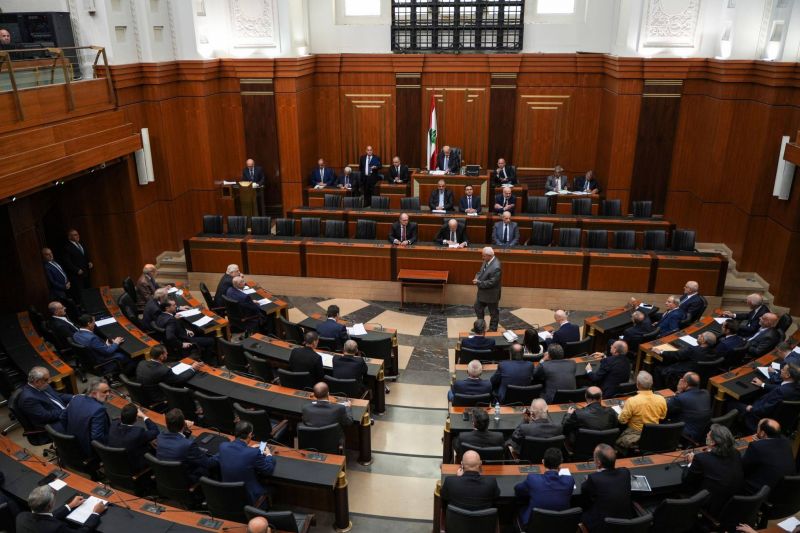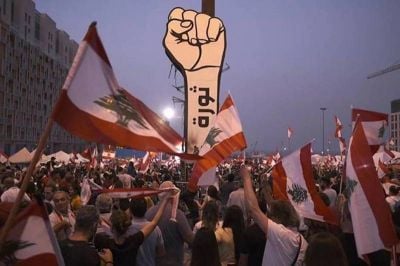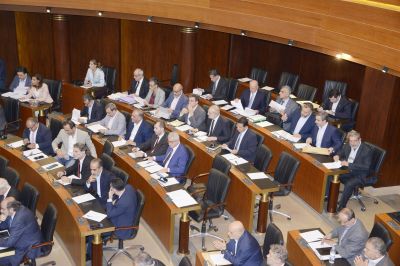
Parliament convenes on Nov. 3. (Credit: Mohammed Yassin/L'Orient Today)
The 27 MPs gathered around the same table Monday. Indeed, it was only after Parliament Speaker Nabih Berri called to convene Parliament for a session on Thursday to read former President Michel Aoun’s letter on the Mikati cabinet resignation decree — instead of seeking to elect a successor to the former president — for this image illustrating the unity of a large portion of the parliamentary opposition to materialize.
But this image of unity was the case only during Monday’s meeting.
This is because, despite the deep differences between its components, Parliament’s opposition blocs know that in order to confront Hezbollah and its allies and to counter its growing influence during the presidential vacancy, it must join ranks around a single candidate. Yet these efforts are still in their beginning stages.
It is with that aim that Kataeb leader Samy Gemayel and Independence Movement leader and presidential candidate Michel Moawad — brought together 27 MPs Monday at the Kataeb headquarters in Beirut’s Saifi neighborhood on Monday.
In addition to the Kataeb, members of the Renewal bloc led by Moawad, as well as Sunni MPs who were previously affiliated with Hariri, representatives of the protest movement and independent MPs were present.
What about the Lebanese Forces, whose leader Samir Geagea is trying to position himself as the head of the parliamentary opposition? Would the Kataeb be in a competition mindset?
“We are not in a mindset of confrontation with anyone,” Salim Sayegh, the Kataeb’s vice-president, told L'Orient-Le Jour.
The LF stated for their part that they do not feel targeted. “We are in favor of any steps that would facilitate an agreement within our camp, even if we did not participate in the Saifi meeting,” said LF spokesman Charles Jabbour, without explaining why his party did not take part in this meeting.
The discussion reportedly focused on the parliamentary session scheduled for Thursday morning at and on the presidential election.
“We wanted to set the record straight: priority should be given to the election of a president instead of drowning in the constitutional excesses to which [Free Patriotic Movement leader] Gebran Bassil wants to lead us,” said Sayegh. He went on to criticize the letter Aoun sent to Parliament just before his departure from Baabda, which called for Najib Mikati to be stripped of caretaker Prime Minister status.
Could the Saifi meeting, the largest of the opposition MPs since May’s parliamentary election, soon bear fruit? “This meeting is part of the dynamics to rally the opposition,” said Sayegh.
“Now is the time for consultations with all the opposition forces that are still hostile, in order to support the candidacy of Michel Moawad,who is so far supported by the Kataeb, the Lebanese Forces, the Progressive Socialist Party and some independents, added Sayegh.
He stressed that his party and, more broadly, the opposition camp “do not intend to let go of Michel Moawad as long as there is no alternative.”
This statement comes as LF head Samir Geagea does not hide the possibility of withdrawing from the battle for getting Zgharta MP Michel Moawad elected, and instead supporting the candidacy of Army chief Joseph Aoun, whose name Geagea was among the first to mention in the media. That is true particularly if this option succeeds in rallying all the components within Parliament that are hostile to Hezbollah and its allies.
Still a long way to go
But such a broad agreement has still not been reached.
In the meantime, the MPs who were previously affiliated with Hariri are sticking to their position that they will continue to write The [new] Lebanon” on their ballots during the upcoming electoral sessions, even if they say they are in favor of a unified opposition.
“We are not against Michel Moawad. But we want to support a candidate who would have a chance to be elected,” said Mohamad Sleiman, an MP from Akkar who took part in Monday’s meeting.
Similarly, the protest movement’s MPs disagree with their colleagues. “We do not see Moawad as the best option for getting the country out of the current crisis,” said Mark Daou, a Forces of Change MP for Aley, who attended the meeting in Saifi.
The MP said he believes that the meeting was a step forward for improved consultation and coordination among members of the parliamentary opposition. “But the presidential election depends on more complex calculations,” he added.
However, L’Orient-Le Jour learned from an MP who declined to be named that Moawad could receive the support of an opposition MP from North Lebanon, after having also obtained support from Waddah Sadek, an MP from Beirut II who recently withdrew from the protest movement’s Forces of Change bloc.
“It is important to bring together the opposition despite the differences,” said an MP who attended the meeting in Saifi, and who requested not to be named due to the sensitivity of the situation. “Everyone is aware that Moawad’s candidacy is now the starting point for any attempt to unite this camp.”
This article was originally published in French in L'Orient-Le Jour. Translation by Joelle El Khoury.

